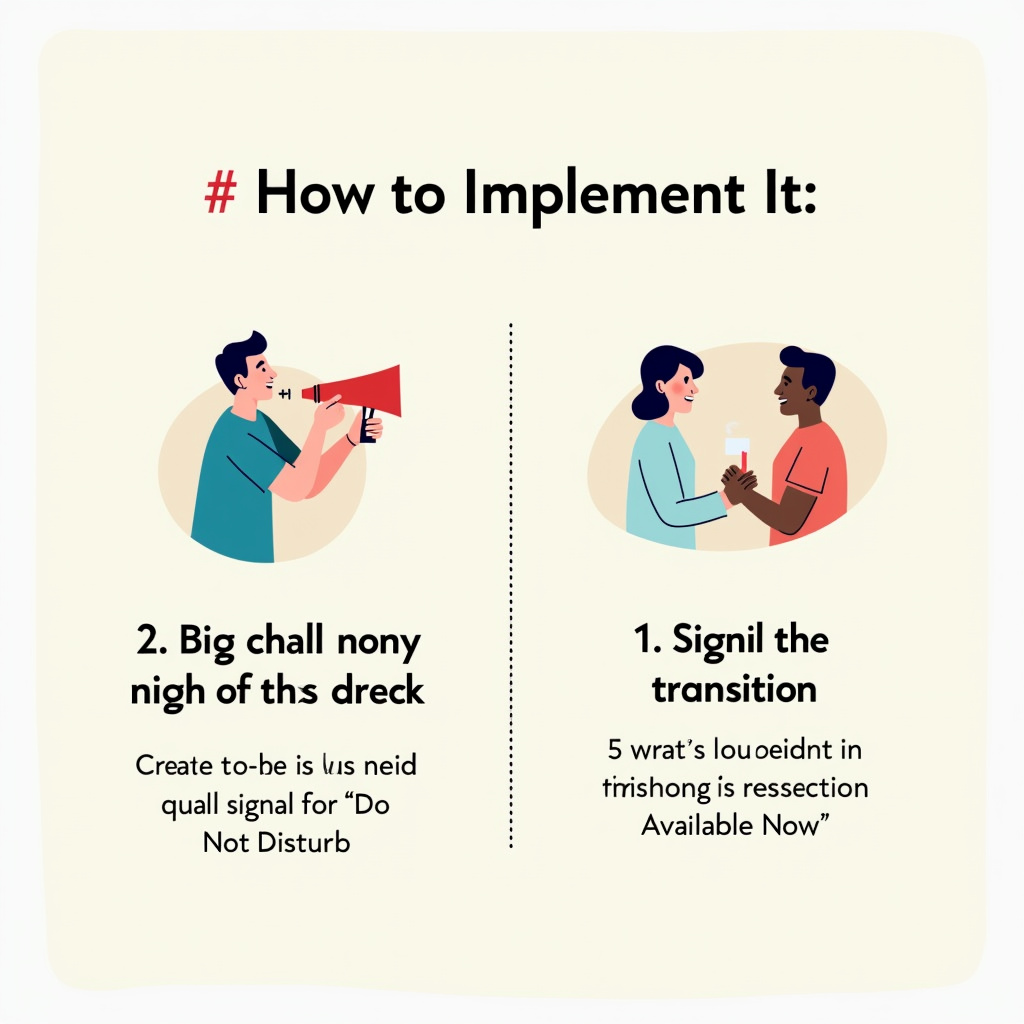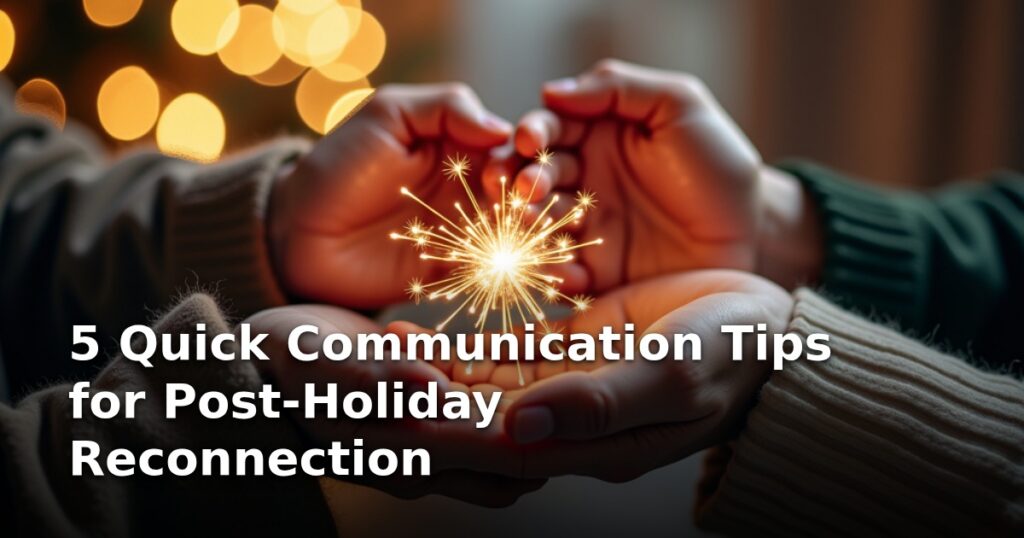5 Quick Communication Tips for Post-Holiday Reconnection
The festive season, while joyous, often brings a unique blend of heightened social interaction, financial strain, and packed schedules. As the dust settles and we transition back into the rhythm of the new year, many couples and families find themselves needing to recalibrate their relational dynamic. This period is crucial for setting the tone for the rest of the year, making holiday relationship advice centered on intentional reconnection invaluable. Re-establishing clear, empathetic communication now prevents minor tensions from escalating into significant relational hurdles later.
This article provides five actionable, high-impact communication strategies you can implement immediately to foster deeper understanding, manage lingering stress, and ensure your most important relationships thrive in the post-holiday environment.
Tip 1: Implement the 10-Minute "No-Agenda" Check-In
One of the quickest ways to bridge the gap created by holiday chaos is by establishing a non-negotiable, dedicated connection point. This is particularly vital for strengthening effective communication in marriage as the year begins.
Why It Works
When conversations are always transactional ("Did you pay the credit card bill?" or "What time is the dentist appointment?"), emotional connection erodes. A no-agenda check-in signals that your partner’s internal world matters more than your to-do list.
How to Implement It
- Schedule It: Book 10 minutes daily (perhaps right after dinner or before bed). Set a timer.
- Define the Rule: During this time, neither person is allowed to bring up logistics, chores, children’s schedules, or work deadlines.
- Focus on Feeling: Use open-ended prompts like, "What was the most surprising thing that happened today?" or "What is one thing you are looking forward to this week?"
Expected Results or Benefits
This ritual rebuilds emotional intimacy quickly. It creates a safe container for vulnerability, which is often the first casualty during stressful periods.
Pro Tip
If you notice signs your partner is pulling away, increase this check-in time to 15 minutes and focus solely on active listening without offering solutions unless explicitly asked.
Tip 2: The "Pre-Mortem" for In-Law Interactions

The stress of navigating extended family gatherings often lingers long after the guests have left. Successfully managing in-law relationship stress requires proactive, rather than reactive, communication about shared experiences.
Why It Works
Instead of letting resentment fester about perceived slights or boundary crossings during the holidays, a "pre-mortem" or "post-mortem" allows both partners to process the event as a united front, reinforcing partnership strength.
How to Implement It
Choose a neutral time (at least 48 hours after the event). Use "I" statements to discuss specific moments, rather than generalizing about the entire relationship.
- Example: Instead of, "Your mother was rude," try, "I felt overwhelmed when Aunt Susan commented on my career choices; I could use your support next time if that topic comes up."
- Develop a Unified Strategy: Agree on one or two specific boundaries you will enforce next time (e.g., "We will leave by 8 PM," or "We will not discuss politics").
Expected Results or Benefits
This transforms conflict into collaborative problem-solving. It ensures both partners feel heard regarding difficult interactions and prevents these specific issues from becoming recurring arguments throughout the year.
Pro Tip
If you are anticipating difficult interactions in the coming year, use this technique as a pre-mortem: discuss the potential conflict before it happens and agree on your joint response strategy.
Tip 3: Define "Recharge Time" Boundaries for Work Stress
As the professional world ramps up, the risk of sacrificing partnership time for productivity increases. Learning staying connected during stressful work periods demands clear, communicated boundaries around personal energy.
Why It Works
Stress often manifests as irritability or emotional unavailability. By clearly defining when you are available and when you need dedicated space to decompress, you manage expectations and reduce the likelihood of snapping at your partner.
How to Implement It
Create a visual or verbal signal for "Do Not Disturb" and "Available Now."
- Signal the Transition: When you finish your workday, take 15 minutes alone to transition (e.g., listen to music, walk around the block).
- Communicate the State: Use a simple phrase: "I need 30 minutes to fully transition from work mode. After 6:30 PM, I’m fully present."
- Honor the Signal: When your partner signals they need space, honor it immediately without guilt, and ask when you can reconnect.

Expected Results or Benefits
This reduces feelings of rejection when a partner seems distant. It prevents work stress from spilling over into the home, protecting the quality of your limited shared time.
Pro Tip
Schedule a "Work Boundary Review" once a month. If one partner consistently feels the boundaries are being ignored, it’s a strong indicator of signs your partner is pulling away due to burnout, necessitating a deeper conversation about workload management.
Tip 4: Schedule a "Future Focus" Date Night
The post-holiday slump can feel aimless. Counteract this by using newfound downtime to intentionally plan exciting future events. This is excellent dating advice for the new year.
Why It Works
Anticipation is a powerful connector. Focusing on a shared, positive future event—whether a weekend trip, a new hobby, or a major goal—reintroduces shared vision and excitement into the relationship, moving beyond the drudgery of routine.
How to Implement It
Dedicate one date night this month exclusively to planning. Do not discuss bills, chores, or logistics.
- Brainstorm Three Tiers: List one small (next month), one medium (next quarter), and one large (next year) shared goal or adventure.
- Allocate Resources: Decide on the first concrete step for the smallest goal (e.g., "We will research flights to X this weekend").
- Make the Commitment: Book one small item immediately to create instant momentum.
Expected Results or Benefits
This reignites the feeling of being "on the same team" moving toward something desirable. It shifts the relationship focus from managing current stress to actively creating future joy.
Pro Tip
If you struggle with effective communication in marriage regarding finances, use this date night to frame financial goals around shared experiences rather than just numbers (e.g., "We are saving for the cabin trip," rather than "We need to cut the budget").

Tip 5: Practice "Micro-Affirmations" Daily
When life gets busy, we often stop noticing the small contributions our partners make. Reversing this trend with small, frequent acknowledgments is a rapid way to boost relationship morale.
Why It Works
Human beings crave validation. Micro-affirmations are small, specific compliments or acknowledgments that validate your partner's effort, even when the effort is mundane. This directly counteracts the feeling of being overlooked, which often contributes to the signs your partner is pulling away.
How to Implement It
Aim for three specific, non-physical affirmations per person, per day.
- Be Specific: Instead of, "Thanks for helping," try, "Thank you for taking the initiative to unload the dishwasher before I even asked; it made my morning significantly calmer."
- Acknowledge Effort: If your partner is struggling with managing in-law relationship stress, acknowledge their resilience: "I noticed you handled that awkward question from your cousin with such grace today. I admire how you protect your energy."
Expected Results or Benefits
Frequent, specific appreciation creates a positive feedback loop. It lowers defensiveness and makes both individuals feel seen, which is the bedrock of strong holiday relationship advice applications for the entire year.
Pro Tip
If you are having trouble spotting good things, consciously look for one thing your partner did to make your life easier, rather than one thing they failed to do.
Conclusion: Making Connection Stick
Reconnection after the holidays isn't about grand gestures; it’s about consistent, small, intentional shifts in communication habits. These five tips—the No-Agenda Check-In, the In-Law Pre-Mortem, Work Boundary Definition, Future Focus Dates, and Micro-Affirmations—are designed to offer immediate, measurable improvements.
To ensure these strategies become habits rather than one-off attempts, start small. Choose just one tip to implement fully this week. Perhaps begin with the 10-Minute Check-In every evening. By prioritizing these quick communication wins, you build the relational resilience needed to navigate the inevitable stresses of the new year successfully, ensuring deeper connection rather than drifting apart.



